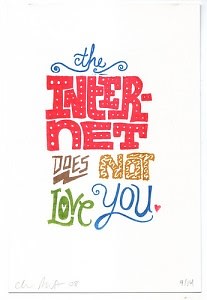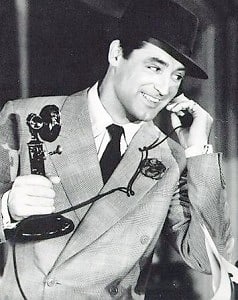 Eight Washington Post reporters hesitantly agreed to quit the internet, and the outcome was a total downer. The rules: "No Web, period. If you need to talk to someone, do it in person or by phone." The results: MASSIVE FAIL. What the week-long experiment revealed about humankind, below:
Eight Washington Post reporters hesitantly agreed to quit the internet, and the outcome was a total downer. The rules: "No Web, period. If you need to talk to someone, do it in person or by phone." The results: MASSIVE FAIL. What the week-long experiment revealed about humankind, below:
"It was old school, it was sweet, it was a moment." writes the reporters' boss, Marc Fisher, about the effects of the web-less week. Marc Fisher dude, were you reading the same essays were were reading? Instead of really reconnecting with others and finding new inspiration for simplified living, the reporters mostly seem to have emerged with a grand and dreary vision about life in the modern age.
1. Our Loved Ones Don't Really Care About Us That Much, And Vice Versa.
"Call me!" Theresa Vargas tells her friend, family and coworkers, since she'll be out of email contact. No one does. When Paul Schwartzman explains the experiment to his wife, she's unfazed by the fact that he'll be mostly out of contact during the day. "Hmm . . . huh? . . . Whatever," she says. As for Annys Shinn, she and and her husband spend most evenings surfing the internet superhighway, "making little eye contact and trading fewer words." She wonders if unplugging is the way to liven up her marriage, but the resulting forty-minute conversation she has with her husband doesn't exactly seem lively. "It was nice," she writes unconvincingly.
 And apparently neither does your family.
[Image by Chris Piascik]
And apparently neither does your family.
[Image by Chris Piascik]
2. The Only Way To Save The Failing Publishing Industry Is If No One Is Allowed To Use The Internet.
Michael S. Rosenwald gleefully reports that he rediscovered reading newspapers over the course of the week, and that he even read a book! (Granted, the book was You Are Not A Gadget by Jaron Lanier; Since it's all about how technology messes you up, it kind of seems like cheating.) Paul Schwartzman also ups his paper-reading . . . along with his boob tube time. Even after emerging from the experiment, Rosenwald's still in the paper-reading game, but no word on whether Schwartzman stuck with it.
It's worth mentioning that these reporters are employed by a newspaper, and yet still don't read newspapers. Ouch.
This loooong, weirdly hypnotic history of the internet is narrated by a British man with a soothing voice.
3. No One Cares About Anything
J. Freedom duLac realizes that he actually doesn't care about most things on the net, writing, "I don't particularly care about what I don't know." Um, this statement might be intended to express his newfound disinterest in insignificant web crap, but it sorta reads as a testament to the death of curiousity. And without the internet, Theresa Vargas is super bored, because nothing in life is interesting. And Paul Schwartzman muses gloomily on whether his kids will ever write love letters by hand. "Does it matter?" he asks himself, and it seems that he feels the answer is no.
4. It Is Impossible To Be Employed Without The Internet.
Theresa Vargas gets early permission to log back on from her boss, because she has to write an article about cyberstalking. (Presumably, the boss who assigned this article is Marc Fisher, the same boss who instituted the no-web rule. Did he set up the whole experiment just to eff with his reporters? Survey says yes.) Brigid Schulte also needs the internet to write a story about Internet rumors. Ian Shapira is writing a story about horse breeding in rural Maryland, but insists he still needs the internet to find statistics.


 Reporters, webcam girls, and Stanley Stuyvesant - just a few of the folks who would be unemployed without the internet.
Reporters, webcam girls, and Stanley Stuyvesant - just a few of the folks who would be unemployed without the internet.
5. Who Are We Kidding? Everyone Cheated At The Experiment, And Then They All Quit Quitting The Internet.
Before quitting the experiment, Theresa Vargas logs on constantly. Brigid Schulte also snuck on the web frequently, for personal gratification as much as for work research. Paul Schwartzman confesses he cheated a little by "peeking at the Blackberry." Ian Shapira immediately abandons the experiment when he's given the option to do so.
Perhaps J. Freedom duLac best sums up the rush back to the internet's embrace: He abandons his experiment afterglow when someone forwards him a funny email. "L.O.L." He exclaims. "Internet, I take it all back. I can't quit you."
Yeah, we can't quit stuff like this either.


.jpg)
.jpg)



.jpg)
.jpg)
.jpg)



